




 |
   |
 |
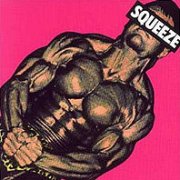 |
Squeeze (1978, 41.39) ***/T |
|
| Sex Master Bang Bang Strong in Reason Wild Sewerage Tickles Brazil Out of Control Take Me, I'm Yours The Call Model |
Remember What First Thing Wrong Hesitation (Rool Britannia) Get Smart |
|
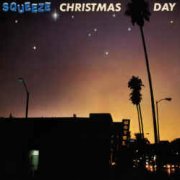 |
7" ( 1979) ***/T Christmas Day Going Crazy |
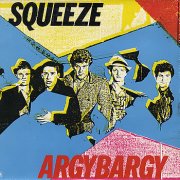 |
Argybargy (1980, 36.14) ***/T |
|
| Pulling Mussels (From the Shell) Another Nail in My Heart Separate Beds Misadventure I Think I'm Go Go If I Didn't Love You Farfisa Beat Here Comes That Feeling |
Vicky Verky Wrong Side of the Moon There at the Top |
|
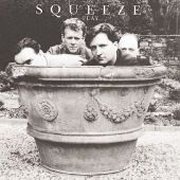 |
Play (1991, 52.27) ***/T |
|
| Satisfied Crying in My Sleep Letting Go The Day I Get Home The Truth House of Love Cupid's Toy Gone to the Dogs |
Walk a Straight Line Sunday Street Wicked and Cruel There is a Voice |
|
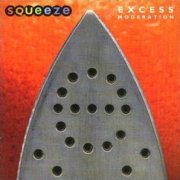 |
Excess Moderation (1996, recorded 1978-93, 156.21) ****/T½ |
|||
| Take Me I'm Yours Model Revue Christmas Day Blood and Guts Going Crazy The Knack If I Didn't Love You Separate Beds I Think I'll Go Go |
What the Butler Saw Piccadilly Trust Tempted Woman's World Squabs on Forty Fab The Elephant Ride Tongue Like a Knife His House Her Home When the Hangover Strikes |
The Apple Tree Within These Walls of Without You On My Mind Tonight Hope Fell Down No Place Like Home What Have They Done? Tough Love Striking Matches Peyton Place Dr. Jazz |
Melody Motel Slaughtered Gutted and Heartbroken Maidstone The House of Love The Truth Letting Go It's Over Loving You Tonight Cold Shoulder Some Fantastic Place |
|
Current availability:
Mellotrons/Chamberlin? used:
I've been waiting to review Squeeze properly ever since I realised that was a Mellotron on their first hit, the sublime Take Me, I'm Yours. The band had been together for a while by the time their first, eponymous album appeared in 1978; not only had they previously been signed to (and dropped by) RCA, but they had self-released their first EP, the sniggeringly-titled Packet of Three in '77, at the height of punk, with which they were briefly and bafflingly associated. What's more, after their rise to prominence at the end of the '70s, the music press (Sounds? NME?) dug out a picture and article from some years earlier, portraying not only a long-haired and hippyfied Chris Difford and Glenn Tilbrook playing low down on some (free?) festival bill, but also quoting some horrible Hare Krishna-type lyrics, doubtless to the pair's embarrassment. None of which stopped them becoming one of the UK's best-loved and, what's more, best purveyors of Intelligent Pop, if you will, churning out deathless classics such as Cool For Cats, Up The Junction and Is This Love? seemingly at the drop of a hat. Or should that be 'titfer'? Any hits compilation immediately garners the full ***** and telling me you don't like them is tantamount to looking for a fight. I've no idea with whom, mind, but I'm sure I'll find someone.
1978's Squeeze is more rock'n'roll than you might expect, if you'd only heard their hits, although when put into context, it makes more sense; this is only eight months after the Packet of Three EP, which did its best to try to compete with the punk (alternative) mainstream on its own terms. Never really an albums band, this one contains its fair share of filler, including second single (and first flop) Bang Bang, although Out Of Control's rampant lasciviousness amuses, while the instrumental Wild Sewerage Tickles Brazil and the bone-dry Hesitation (Rool Britannia) impress. The album's best track by a country mile is, of course, Take Me, I'm Yours, which still sounds like nothing else before or since; synth-heavy psychedelic pub-rock, the leader in a genre of one. Mr. Tilbrook says, "This song is conclusive proof that we were at the forefront of second wave use of the Mellotron", just in case there was any doubt regarding the matter. It was apparently a last-minute add-on, as A&M 'couldn't hear a single', so they 'hired lots of synths and a bloke who knew how to work them and pretended to be Kraftwerk'. Can't say it worked on that front, but it's a fantastic record and on top of said synths, features plenty of pitch-bent Mellotron choir, doubtless from 'just a keyboard player back then' Jools Holland.
The second Squeeze Mellotron entry is an obscure b-side, Going Crazy, the b-side to non-album non-hit Christmas Day, although its choir contributions are hardly the most major use you're ever going to hear. Their third album, 1980's Argy Bargy, starts insanely strongly with the two hits, Pulling Mussels (From The Shell) and Another Nail In My Heart, although the rest of the record's no slouch, material like the excellent Farfisa Beat and If I Didn't Love You belying the old 'singles bands can't write album tracks' cliché. Mellotronically speaking, Jools plays nowt but choirs, with a single chord on Misadventure and a fairly major part running through the atmospheric Here Comes That Feeling, complete with 'tape choke off' wobble at the end of the track, just in case there were any doubt.
The only other Squeeze album (to my knowledge) that contains any form of tape-replay is 1991's Play, a fairly ordinary effort, with too many overlong songs (don't have to edit now we've got CD, eh?). It certainly isn't a bad album, but it struggles to reach beyond 'average', at least to my ears. Mellotron (or Chamberlin?), possibly from Elvis Costello's on-off keys man Steve Nieve, with strings and flutes on Letting Go and flutes on The Day I Get Home, though nothing you can't live without.
Excess Moderation is a rarity on this site, being a compilation of mostly previously-available material; amongst the 40 tracks on display here are several single-only efforts, one from a soundtrack and a handful of outtakes, including a different (and slightly inferior) take on mega-hit Tempted. Basically, it's a trawl through their catalogue, avoiding most of the obvious ports of call; think of it as a companion piece to their original definitive greatest hits, 45's and Under and you won't go too far wrong. The booklet gives a track-by-track commentary by Difford and Tilbrook, shedding light onto the writing and recording process for those who care about such things. Given that all three Mellotron tracks here are available elsewhere (admittedly, in the case of Going Crazy, on the flip of, er, a flop), there are ground for eventually removing this album from here entirely, though given that one track's relative rarity, I shan't. Is it worth it for the music? Yes; it gives considerable insight into the band's career for those who've only really heard the hits. Is it worth it for the Mellotron? Probably not; if you have a hits compilation, you have the best of the three relevant tracks anyway, although the other two are worth hearing. I think this is still in print; I found a second-hand copy, but worth picking up if you see it at a decent price. And I didn't mention kitchen sinks once.
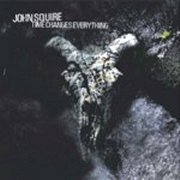 |
Time Changes Everything (2002, 46.52) ***½/TT½ |
|
| Joe Louis I Miss You Shine a Little Light Time Changes Everything Welcome to the Valley 15 Days Transatlantic Near Death Experience All I Really Want |
Strange Feeling Sophia |
|
Current availability:
Mellotron used:
Ex-Stone Rose John Squire loses no time on his solo debut, Time Changes Everything, in reaffirming his love of the '60s, although this isn't actually meant as a criticism (whaddaya mean, 'for once?'). His previous band, the Seahorses, put out one album, Do it Yourself (two Mellotron tracks) as long ago as 1997, so he's obviously opted to take a little time over this one, probably helped by releasing it on what appears to be his own label. If I'm going to be honest (I try, I try), I don't like Squire's rasp of a voice at all, but his songs are OK, if not exactly classic and the sound of the album makes up for some of its musical failings. He's also resisted the temptation to stuff his new album full of songs fit only for b-sides or future 'rarities' compilations that everyone will buy and no-one will play and has stuck to sensible 'vinyl' length.
John Ellis plays decidedly analogue, in fact, pre-synth keys throughout and puts down some decent Mellotron work on several tracks. Opener (single and probably best track) Joe Louis is smothered in strings, while Shine A Little Light features a semi-obscured flute melody and Welcome To The Valley and Strange Feeling have polyphonic cello parts that sound highly Mellotronic. In case there's any doubt as to the veracity of the Mellotron, both Joe Louis and Sophia have pitchbent string parts, particularly the intro to the latter.
So; considerably better than expected, to the point where I found that three stars didn't quite suffice. Don't go expecting a full-on '60s recreation, but Time Changes Everything is a pleasant enough listen, if a little unengaging in places. The Mellotron work isn't bad, so if you see it cheap (as I did), it may just be worth picking up.
See: Seahorses
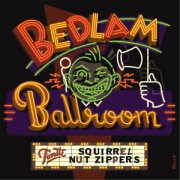 |
Bedlam Ballroom (2000, 38.10) ***/½ |
|
| Bedbugs Baby Wants a Diamond Ring Do What? Bent Out of Shape Stop Drop and Roll Hush It All Depends Bedlam Ballroom |
Just This Side of Blue Don't Fix it Missing Link Bedlam Reprise Do it This a Way |
|
Current availability:
Chamberlin used:
Squirrel Nut Zippers are a modern good-time swing outfit, of all things, inactive throughout most of the '00s, although their website states that activity is imminent. 2000's Bedlam Ballroom is something like their fifth album, stuffed with presumably self-penned ditties largely in a '30s style, taken at varying paces, mostly led by banjo and brass. Top tracks include opener Bedbugs, the title track and frenetic closer Do It This A Way, but nothing here offends.
Jim(bo) Mathus plays Chamberlin, with a cello line on the title track, although all other string and flute parts appear to be real. This is music made for dancing, not quiet contemplation at home, so if you like the sound of their, er, sound, I'm sure they're best sampled on stage. Saying that, this is a good album, but not one you'll bother with for its tape-replay work.
Stackridge (UK) see: |
 |
 |
Valhall (1973, 39.49) ***/T |
|
| Väg Tid och Rum Valhall Göteborgsposten En Liten Fågel Zaïre Försommarnatt Vid Tjärnen Vägen är Målet |
Robotnik Far Har Förtäljt Arbetarblot |
|
Current availability:
Mellotron used:
According to Swedish Wikipedia, Bernt Staf (1945-2002) was as much a left-wing political activist as a musician; I've read that 'progressive rock' was as much a political movement as a musical one in Sweden in the '70s, so I suspect that's what we're encountering in the shape of his fourth album, 1973's Valhall. Is this 'progressive'? It's certainly progressive in intent, although little of it sounds like the modern idea of prog, more low-fi folk combined with strange singalongs, plus the occasional foray into something more energetic, such as the funky blues of Vägen Är Målet. To be brutally honest, going by the evidence, Staf couldn't sing a note, while some of the playing on the album leaves something to be desired, but I presume that isn't really the point. This was a Swedish album made for a Swedish audience; if foreigners can't understand the lyrics, that's their problem, not his. Anyway, better tracks include Zaïre, Försommarnatt and (at a pinch) Arbetarblot, but this barely scrapes three stars, to be honest.
Bo Hansson plays Mellotron on closer Arbetarblot, with M400 brass and choir parts (an unusual combination), merely adding to the album's weirdness. I can't imagine there's a huge appetite for this music these days; Staf died in 2002, so I doubt whether a reissue programme's likely any time soon.
See: Bo Hansson
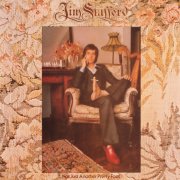 |
Not Just Another Pretty Foot (1975, 36.39) ***/TTT |
|
| Making Love With the Headphones on None of Us Are Here I Got Stoned and I Missed it I Can't Find Nobody Home Lady Greenfeet You'll Never Take Me Alive Midnight Snack Bring Me You |
Your Bulldog Drinks Champagne I Ain't Working |
|
Current availability:
Mellotron used:
Jim Stafford seems to have been pigeonholed as a country artist, but going by '75's Not Just Another Pretty Foot, complete with 'smokes cigarette with foot' sleeve pic, singer-songwriter would seem to be a better description. Notorious for 'novelty' songs, I Got Stoned And I Missed It is a little unnecessary, but the bulk of the album consists of perfectly good, varied material, if very much of its time. Opener Making Love With the Headphones On may possibly be the highlight, but that could just be in the lyric department; suffice to say, despite a couple of novelty efforts, although dated, this could be a lot worse.
Alan Lindgren plays ARP strings and 'Melatrone' (hey! New mis-spelling!), with the latter, startlingly, on almost every track, mostly strings, but with flutes on a couple of tracks, too. No especially standout performances, although there are some interesting pitchbent strings on Midnight Snack that you don't hear every day. So; an OK record, though not one that's going to appeal to most of you, but plenty of Mellotron, admittedly in 'string section substitute' mode.
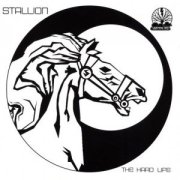 |
The Hard Life (2007, recorded 1974-79, 54.46) ***/½ |
|
| If Life Were Death Arsony in the UK Fresh Out of Borstal The Hard Life Open Door Creamed Genes The Way The Hard Life (live) |
You Make Me Happy Cobra Skinny Kid |
|
Current availability:
Mellotron used:
Stallion, from Hastings, on England's south coast, were a kind-of progressive outfit, albeit a) rather late in the game and b) not actually that good, frankly. Saying that, it can't have been easy trying to play prog through the 'Year Zero' attitude of the '76-77 punk scene, which probably explains the raucous likes of Fresh Out Of Borstal, one of the less worthwhile tracks on 2007's The Hard Life, consisting of demos made between 1974 and '79. Most of their material was song-based prog-lite, with little genuine complexity, but then, perhaps that wasn't the sound they were going for. It's possibly at its best on opener If Life Were Death and The Hard Life, while their lone 7", Skinny Kid, that closes the set, has a certain catchy charm, although John Wilde's vocals on most tracks leave something to be desired.
Phil Thornton plays Mellotron on a handful of tracks, presumably all recorded at the same session, with background strings on punk pisstake Arsony In The UK and The Hard Life and background choirs on The Way, although there's nothing obvious on Fresh Out Of Borstal, despite a credit. Actually, I'll tell you who this reminds me of: some of the many second- and third- rate bands that appeared at the beginning of the '80s under the umbrella of the 'prog revival', only several years early, Bands who wanted to play prog, but never really had the compositional chops, or, in many cases the equipment.
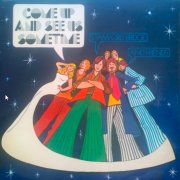 |
Come Up & See Us Sometime (1970, 36.07) **½/T |
|
| Little Boy Blue Roly Poly Johnny Rebel Happiness and Rainy Days Come Up and See Me Sometime Face in the Crowd Falling in and Out of Love Chelsea |
Molly Perkins Wonder Lady Yours Sincerely Vicar's Daughter What Do I Care |
|
Current availability:
Mellotron used:
Stamford Bridge (named for Chelsea's home ground, going by the lyrics to, er, Chelsea) were one of many John Carter projects that reared their rather cheesy, mainstream heads between the mid-'60s and '70s. This lot released two albums, the first of which, 1970's Come Up & See Us Sometime, skates perilously close to the era's 'toytown pop' and not in a good way, at its least irritating on Face In The Crowd, Wonder Lady and Yours Sincerely. But what, I mean what is going on with Roly Poly? This outrageous piece of fat-shaming wasn't even acceptable then (was it?); did I hear "...about the size of Mama Cass" at one point? Fuck's sake; this was actually released as a single. It was another time, wasn't it?
Ken Lewis plays a perfectly acceptable Mellotron string part on Johnny Rebel (and is that a trombone (?) solo?), making it easily the best thing about this deservedly-forgotten effort. Perhaps I'm being a little unfair, but this typifies the era's most disposable pop, albeit not as badly as the horrible Middle of the Road. At least they never used a Mellotron. Or did they?
See: John Carter
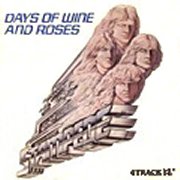 |
Days of Wine and Roses EP (1982, 15.08) ****/TDays of Wine and RosesMovin' on Photographs Missing You |
 |
Hurricane Town (1983, 40.43) ***½/TI've Been ToldLove Letters Casino Junkie The Other Side Turning in Circles Hurricane Town Girl The Runner Mexico |
Current availability:
Mellotrons used:
Stampede appeared around 1981, rising from the ashes of the Bristol-based Lautrec, while just about hanging on to the fast-fading NWoBHM movement, such as it was. Notable for the singer being the guitarist's stepfather (!), both bands had a rather Lizzy/UFO sound; in fact, guitarist Laurence Archer went on to play in both Phil Lynott's post-Lizzy project, Grand Slam and eventually UFO themselves. So basically, we're talking melodic hard rock without having that dreadful wussy American sound that the likes of Grand Prix appropriated. Talking of which, it appears that when Sammy Hagar toured his Standing Hampton (arf arf, phnar phnar) album around this time, he got Grand Prix to support solely on the basis of their name. As our US cousins would say, "Go figure"...
Er, anyway... Stampede were snapped up almost immediately by Polydor and had a dodgy live album, The Official Bootleg (***½) (says it all, really) rush-released by the label, doing the band no favours at all. They had already lost their keyboard player and contracted to a four-piece, but they always missed the keys on stage and smothered their studio recordings with them. Within months, they released their debut single, Days Of Wine And Roses, with the 12" EP version irritatingly appearing a week or two later (I've still got both versions as a result). The EP is magnificent, especially the two tracks not on the 7", with some great keyboard work from original keys man Alan Nelson, including a nice bit of Mellotron choir on Movin' On.
Unfortunately, by the time of their one and only studio album, Stampede had already recorded many of their best songs, leaving an album of too many also-rans. Hurricane Town's title track (more choirs, from Magnum's Mark Stanway this time) and the single The Other Side are great, but many of the other songs have that 'filler' smell about them. There's a good Stampede compilation to be er, compiled, but you'd really have to pick and choose. Thanks to Reuben Archer for the info on the EP, incidentally.
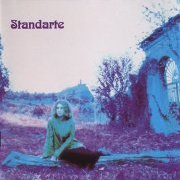 |
Standarte (1994, 47.00) ***½/TT½Dream Love SequencesOne Strange December Evening As I Wandered Tolerance Town Beat Pimp Muzak A War is Declared In My Time of Dying Traumland I Want You |
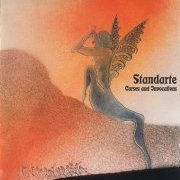 |
Curses & Invocations (1997, 50.28) ****/TTTTT |
|
| Dysangelium What More I Have to Pay Cities of Towers Ordeal Gehenna Arrival of the Traveller Herald Mooning Around the Mill Hill |
N.T.F.B.Y. The One You Fear and Hate Crossing |
|
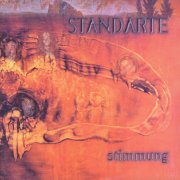 |
Stimmung (1998, 50.12) ***½/TT½ |
|
| Intro (We Want) a Peaceful Village Kankweezler Stimmung Sonnermensch Moon in Cancer Dark Satanic Mill In My Time of Dying |
Yellow Cave Woman I Won't Start Another Song |
|
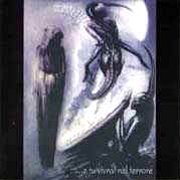 |
...E Tu Vivrai Nel Terrore (1998, 9.17) ****/TTT[Standarte contribute]Necropolis incl.Verso l'Ignoto |
 |
Thousand Days of Yesterdays: A Tribute to Captain Beyond (1999) ****/TTT[Standarte contribute]Myopic Void |
Current availability:
Mellotrons used:
Standarte fall fairly and squarely into organ-driven hard rock/prog territory, being vaguely akin to America's Bigelf, or, historically speaking, Atomic Rooster. Having not released anything for five years at the time of writing, I rather suspect that they're no more; their website is full of dead links and I can't trace any current information about them anywhere. It would be easy to criticise the band for their considerable lack of originality, but that would be to rather miss the point; they obviously idolise early-'70s British hard rock and don't care who knows it. The whole purpose of their existence is/was to recreate an era they love, which makes them ideologically identical to a million '60s-influenced outfits, just less fashionable. And as for '80s revivalists, let's just not go there...
Standarte is a solid enough debut, although it rarely transcends its influences, to be brutally honest; the songs aren't at all bad, but I keep spotting stolen riffs, which can be slightly disconcerting. Strangely, Michele Profeti's Mellotron use tails off as the album progresses. The first sound you hear is Mellotron strings on Dream Love Sequences, with flutes on One Strange December Evening and Beat Pimp Muzak, but a couple of the marked tracks only have a few seconds of The Beast under their spoken intros (there seems to be some sort of storyline running through the album). Sparse choirs on A War Is Declared and a few seconds of cello and that seems to be it. Oh and while In My Time Of Dying has the same lyrics as Led Zeppelin's version of the old blues standard, the tune is completely different.
Three years passed before their follow-up, Curses & Invocations and it was immediately obvious that although the style remained the same, the songwriting had improved no end. The band chose to cover Gracious!'s Return Of The Traveller from This is... Gracious!, but otherwise stuck to their own material. Profeti's Mellotron use here is better and far more varied than on their debut; Dysangelium opens with a fantastic string part and what I take to be solo trumpet starts What More I Have To Pay off nicely. There's ridiculously heavy Mellotron on Ordeal, with female voices, flutes and strings all vying for attention, not to mention the almost overpowering strings on Gehenna. Actually, the album's a complete Mellotron monster, with at least half the tracks featuring it as, essentially, a lead instrument. The music's good, but the Mellotron's fantastic. Buy.
In retrospect, it looks like the band were already starting to wind down on Stimmung, as half its tracks are live, including another (and slightly unnecessary) version of In My Time Of Dying. The studio tracks (1-5) tend to be better, with less jamming, but I suppose that's only one man's opinion. After Curses & Invocations, Profeti obviously decided to cut back a little on his Mellotron use and it's not just because of the live tracks, as he used it onstage. Intro has (male?) choir, (We Want) A Peaceful Village has a short burst of strings and Kankweezler is effectively based on a Mellotron flute riff, but the most major use on the album is the first live track, the instrumental Moon In Cancer, with an excellent strings part opening the song.
Well, Curses & Invocations is by far and away their best Mellotron album and the material sounds superior to my ears, too, but their first and third releases are still worth the effort on both fronts. It appears, by the way, that the band has essentially morphed into psych monsters London Underground, so no more Standarte. Pity. Incidentally, the band recorded one track for Black Widow's 1998 ...E Tu Vivrai Nel Terrore set, Necropolis incl.Verso l'Ignoto, including plenty of decent string, flute and choir work. Hear it.
See: ...E Tu Vivrai Nel Terrore | London Underground
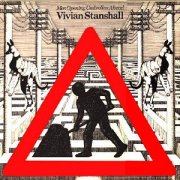 |
Men Opening Umbrellas Ahead (1974, 41.44) ***/½ |
|
| Afoju Ti Ole Riran (Dead Eyes) Truck-Track Yelp, Bellow, Rasp et Cetera Prong Redeye How the Zebra Got His Spots Dwarf Succulents Bout of Sobriety |
Prong & Toots Go Steady Strange Tongues |
|
Current availability:
Mellotron used:
I sincerely hope there's no-one reading this who isn't at least vaguely familiar with the late, legendary Vivian Stanshall, linchpin of the Bonzo Dog (Doo Dah) Band, one of the most eccentric outfits ever to tread Britain's fair concert stages (not to mention most of the grotty ones). Outside the Bonzos, Viv's best-known for his 'master of ceremonies' role on Tubular Bells and his thoroughly deranged, long-running narrative Sir Henry at Rawlinson End (come on, BBC, let's have an official release for those Rawlinson Peel sessions), but he also produced a handful of offbeat solo albums.
His first such was 1974's Men Opening Umbrellas Ahead (an old joke concerning the British 'roadworks' sign, for those not in the know). Backed chiefly by members of Traffic and Family, it's every bit as eccentric (that word again) as you'd expect, swerving drunkenly from slightly overlong, twisted Afrobeat opener Afoju Ti Ole Riran (Dead Eyes) through the, er, 'unique' blues of Truck-Track, Viv's very personal take on the talking blues, Yelp, Bellow, Rasp Et Cetera, the nominally 'soulful' Redeye, the hilariously obscene reggae of How The Zebra Got His Spots... I think you get the picture. If I'm going to be searingly honest, however, without Stanshall's vocal gyrations, this would be no more than a sub-late-period Traffic album, mainstream '70s rock in all its lack of glory. Thankfully, however, the Ginger Geezer is present and correct throughout, dragging the whole thing up to 'acceptable'.
"There's Mellotron on this?", I hear you cry. Er, sort of. OK, yes, there is. For a few seconds at the end of the album. Because...? Skronky strings, for what it's worth, played by (unknown), quite possibly Steve Winwood. Stanshall fans almost certainly already own this already, but I'm not sure the rest of us need to, although much of it's worth hearing at least once.
See: Bonzo Dog Band
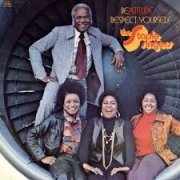 |
Be Altitude: Respect Yourself (1971, 42.02) ***½/TT |
|
| This World Respect Yourself Name the Missing Word I'll Take You There This Old Town (People in This Town) We the People Are You Sure |
Who Do You Think You Are (Jesus Christ the Super Star)? I'm Just Another Soldier Who |
|
Current availability:
Mellotron used:
Roebuck "Pops" Staples wisely dropped the final 's' for his family singing group, based around himself and three of his four children, recording between the late '50s and Pops' death in 2000. 1971's Be Altitude: Respect Yourself is a solid collection of gospel-tinged soul, neatly avoiding the schmaltz of the emerging Philly sound, concentrating instead on a Southern feel, aided by the Muscle Shoals studio collective.
Terry Manning plays Mellotron on a few tracks (thanks, Chris), with 'orchestral replacement' strings and flute melodies on Name The Missing Word, Are You Sure, Who Do You Think You Are (Jesus Christ The Super Star)? and closer Who. I won't try to pretend that this could appeal to the non-soul fan, but, within its field, it's a faultless example of the style.
 |
You Are Not Alone (2010, 45.08) ***/½ |
|
| Don't Knock You Are Not Alone Downward Road In Christ There is No East or West Creep Along Moses Losing You I Belong to the Band Last Train |
Only the Lord Knows Wrote a Song for Everyone We're Gonna Make it Wonderful Savior Too Close/On My Way to Heaven |
|
 |
One True Vine (2013, 34.51) ***/0 |
|
| Holy Ghost Every Step Can You Get to That Jesus Wept Far Celestial Shore What Are They Doing in Heaven Today? Sow Good Seeds I Like the Things About Me |
Woke Up This Morning (With My Mind on Jesus) One True Vine |
|
Current availability:
Mellotrons used:
I'd have thought that Mavis Staples needed little introduction: the youngest of the four sisters comprising the Staple Singers, along with their father, "Pops" Staples, she's released a dozen or so solo albums in forty-odd years, working with Prince and Ry Cooder, amongst others. 2010's Grammy-winning You Are Not Alone (produced by Wilco's Jeff Tweedy) is a gospel/Americana collection, perhaps a little blander than you might like (thus the Grammy), better tracks including the title track, Last Train, Wrote A Song For Everyone and raw blues closer Too Close/On My Way To Heaven. Wilco's Patrick Sansone plays Mellotron on In Christ There Is No East Or West, with what sounds like a high cello part, although it could even be muted brass. This is a surprisingly bluesy release from a singer noted for her gospel/R&B tendencies that might even appeal to Wilco fans, but I wouldn't even think about it for its Mellotron content.
2013's One True Vine is a little earthier than its predecessor, certainly less glossy, which can only be a good thing. Top tracks? Despite the extreme wish-fulfilment lyrics, gospel numbers like Far Celestial Shore and What Are They Doing In Heaven Today? have a real presence about them. Tweedy's credited with Mellotron this time round, on What Are They Doing In Heaven Today?, otherwise known as What Are They Doing With Wilco's Mellotron Today? I'm sure it's there, buried under the muted brass, but I've no idea what it might be doing.
See: Wilco
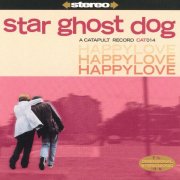 |
Happylove (1998, 36.44) **½/T |
|
| Downer Master #1 Tell Everyone We're Dead Plus de Vaches Happylove Heroin Face Moon Boot You're Not There |
Kite It Happens All the Time Senga's Theme After All |
|
Current availability:
Mellotron used:
The Massachusetts-based Star Ghost Dog were the brainchild of Ginny Weaver and Brendan Lynch (nothing to do with the Weller collaborator), whose debut, 1998's Happylove, is possibly best described as an indie/powerpop crossover, like The Brian Jonestown Massacre, maybe, but better. Highlights include opener Downer and Plus De Vaches, although the indie side of their sound becomes wearing after a while, even on such a short album.
Pete Weiss (Willard Grant Conspiracy, others) plays Mellotron flutes on Tell Everyone We're Dead and After All, sounding just about real enough to be, y'know, real. After a second album, the band split in 2001.
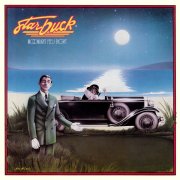 |
Moonlight Feels Right (1976, 32.41) ***/½ |
|
| I Got to Know Drop a Little Rock Lash LaRue The Slower You Go (The Longer it Lasts) Moonlight Feels Right I'm Crazy So the Night Goes Working My Heart to the Bone |
Lucky Man Bordello Bordeaux |
|
Current availability:
Mellotron used:
Starbuck's debut, 1976's Moonlight Feels Right, is one of those albums I've clocked in second-hand shops for decades, due to its superb, creepy sleeve painting, all vampiristic 1920s fetishism. I mean, what's happening in this picture? Sex? Crime? Death? All of the above? Sadly, after such a splendid front-end, the music is kind of Southern soul/funk, only standing out (to my ears, anyway) from the average due to the synth work across the album and the quality of songs such as I'm Crazy and closer Bordello Bordeaux.
Although uncredited, it's presumably one of the two keys men, Sloan Hayes or Bruce Blackman, on Mellotron, with strings, quite different from the album's real ones, all over Working My Heart To The Bone. Nice to (just about) hear, but far from essential.
 |
Citadel (1977, 39.15) ***½/TShine on BrightlyShadows of Song Can't Think Twice Wings of White Evening Wind Change in Time Could This Be Love Why Have They Gone |
Current availability:
Mellotron used:
Champaign, Illinois outfit Starcastle were one of the handful of US progressives to get a 'proper' deal (Epic in this case) and actually managed to release four albums in their lifetime. Starcastle (****) and Fountains of Light (****) were both good, in a 'complete Yes copyist' kind of way, although by Citadel the cracks were just beginning to show, with more and shorter tracks, although their overall style hadn't changed that much. Their multi-layered harmonies sound like a cross between Yes and their Champaign colleagues REO Speedwagon, on whose first album singer Terry Luttrell appeared and the guitars lack Steve Howe's quirky individuality, but other than that, read 'Yes-lite' for a pretty accurate description of their sound.
Keyboard man Herb Schildt is credited specifically with Mellotron here, although there's definitely none to be heard on their first two albums. For that matter, there's not that much here, either, with nowt but a smattering of background choir on Evening Wind and only a fraction more on Why Have They Gone. So, a good, if not great, album, but don't even bother for the Mellotron.
WARNING! Avoid like the plague Starcastle's fourth 'effort', Real to Reel (**). This is absolutely appalling AOR, with only closing track When The Sun Shines At Midnight being anything less than utterly offensive. File under 'shite'.
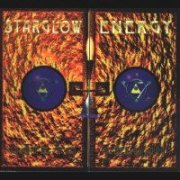 |
Gate to Celdan (1998, 42.52) ***½/T½Dance of the TrollsFly Into the Rainbow Time Traveller Vengeance The Rite Celdan (the World of Colours) Certain Friends |
Current availability:
Mellotron used:
It seems Gate to Celdan is actually Starglow Energy's fifth album, including a live release, which is a fair bit for a band so little known. Going by this album, their sound is a Uriah Heep-ish early-'70s style hard rock with a progressive feel in places; extremely retro, anyway, with plenty of Hammond solos and other period touches, not least the opening minute-long drum solo (!). It's not bad and sounds authentically 'old', but... Maybe I need to play this some more, but like so many other bands who try to do this style (with the honourable exception of Spiritual Beggars), it doesn't really capture what made Heep et al. so great; maybe it's the songs? Anyway, this is OK, without being particularly outstanding.
According to the Black Rills site, the (borrowed) Mellotron used on Gate to Celdan was the same one used one Kedama's sole album, a good twenty years earlier. It's played here by Luky Bosshardt, although only on the 'side-long' Celdan (The World Of Colours), a partially jammed-out epic, fairly heavy on the strings. Amusingly, the band opted to fill the near-five minute gap before the unlisted Certain Friends with 'end of LP' noise, with the needle clicking in the runout groove. Very good, chaps, especially as the 'needle' goes 'back down' before track 7... Ironically, said bonus track is possibly the best thing here, so I've no idea why they've tried to hide its light under a bushel, especially since its title is clearly easily available (well, I found it).
So; an average-ish retro-style release, with one OK Mellotron track. Good, but not that good. Given the lack of an official website and no information about subsequent releases, I think it's safe to assume the band have split up, which is a shame, particularly now that their retro approach has entered the mainstream. Bad timing, boys.
 |
From in the Shadows (1999, 49.16) **½/T |
|
| Fall Anyway Don't Let Them You Empty Mind North Winds Woman Prisoner Masquerade |
Suspicions Dripping War Mindreader Dreams You Had Everything |
|
Current availability:
Mellotron used:
Shelby Starner was a remarkably mature teenage singer-songwriter, signed to Warner Bros aged fourteen, which may have been the start of her problems. After one, surprisingly dark, rocky album, 1999's From in the Shadows, she ran into the classic 'second album syndrome', dipping out of the business for a while when her mother announced she had breast cancer. Somewhere along the way, Shelby developed bulimia, dying in 2003, aged nineteen. The material on the album is nothing startling, being fairly derivative of Fiona Apple and her ilk, but that still makes it several trillion times better than that of your typical pop starlet, making her untimely death all the more tragic.
Gary Breit plays Chamberlin, with string swells on North Winds Woman and a chordal part on Prisoner, although the strings on You and a couple of other tracks appear to be real. I'm not saying this is a classic - in fact, were Starner still alive, I'd probably dismiss it as a Bonnie Raitt/Stevie Nicks wannabee effort - but given the circumstances, I feel justified in saying that it's far better than I'd expected, although its Chamberlin use is predictably low.
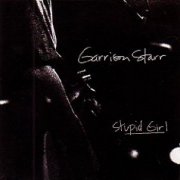 |
Stupid Girl EP (1995, 34.08) **½/½RebelStupid Girl Molly Wooden Instrument Pattycake Pauper Voices |
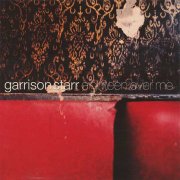 |
Eighteen Over Me (1997, 46.22) **½/½ |
|
| Grounded Superhero Clearer Passing Afterall Ugly Bruises What I Wish For |
Eighteen Over Me Molly Together |
|
Current availability:
Mellotron used:
Going by her second release, the EP/mini-album Stupid Girl, Garrison Starr sits firmly in downbeat, Americana-influenced singer-songwriter territory; you know, the kind of stuff where the words are more important than the music. She doesn't help her cause any by her deliberately tuneless vocals, to be honest; yeah, Bob Dylan got (and still gets) away with it, but as many hate him as love him for it, while his songs are vastly better. Like Bahb, Ms. Starr likes to write reams of lyrics, making for six- or even seven-minute songs. Unlike Bahb, whatever she's got to say for herself becomes irrelevant when said songs are as tedious as these, with pretty much no change in pace throughout the disc's half-hour-plus length. Clay Jones is credited with Mellotron, but it only even vaguely appears on closer Voices, with background cellos under the real violin, plus possibly a few seconds of strings.
1997's Eighteen Over Me is a slight improvement, at its best on the heavy psych of Passing, the downbeat Ugly and Bruises, although, once again, too many tracks fall into the 'overlong and tedious' category. Dennis Herring adds distant, yet real-sounding Mellotron strings to Ugly, to passable effect. Some of you may go for these. I know I didn't, but I'm not usually that interested in whatever singer-songwriters go on about, as it's usually fairly self-absorbed and, frankly, boring (top names excepted, before you all start shouting at me). Anyway, next to no Mellotron and particularly dull instrumental interplay throughout.
See: Samples etc.